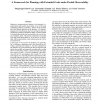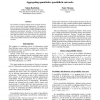AIPS
2003
13 years 9 months ago
2003
Grid computing gives users access to widely distributed networks of computing resources to solve large-scale tasks such as scientific computation. These tasks are defined as stand...
AIPS
2003
13 years 9 months ago
2003
Planning in nondeterministic domains with temporally extended goals under partial observability is one of the most challenging problems in planning. Subsets of this problem have b...
AIPS
2003
13 years 9 months ago
2003
Despite a number of similarities, vehicle routing problems and scheduling problems are typically solved with different techniques. In this paper, we undertake a systematic study o...
AIPS
2003
13 years 9 months ago
2003
We present economically augmented job shop scheduling (EJSP) as an example of a coordination problem among selfinterested agents with private information. We discuss its signific...
FLAIRS
2006
13 years 9 months ago
2006
The project MediaFlies implements an interactive multiagent system that incorporates flocking and synchronization in order to generate a constantly changing visual output. It reli...
FLAIRS
2006
13 years 9 months ago
2006
Extensible Dependency Grammar (XDG) is new, modular grammar formalism for natural language. An XDG analysis is a multi-dimensional dependency graph, where each dimension represent...
FLAIRS
2006
13 years 9 months ago
2006
FLAIRS
2006
13 years 9 months ago
2006
In this paper, we will study semantics that have been used for conditionals in the area of knowledge representation and reasoning: A purely qualitative semantics based on the popu...
FLAIRS
2006
13 years 9 months ago
2006
The huge volumes of unstructured texts available online drives the increasing need for automated techniques to analyze and extract knowledge from these repositories of information...
FLAIRS
2006
13 years 9 months ago
2006
In knowledge engineering research the refinement of manually developed intelligent systems is still one of the key issues. Since scoring rules are an intuitive and easy to impleme...


